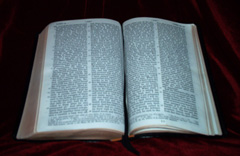
Showers Of Blessing
Witness
Acts 1:21-22, 26; Acts 2:14, 32; Esther 6:1-middle of 6; Esther 9:4; Esther 10:3; 2 Corinthians 13:1
I just have an impression as to the matter of witness, beloved brethren, and the result of witness. The scripture we read in Corinthians points to the importance of witness, and this principle is stated both in 2nd Corinthians 13 and in Matthew 18: the importance of two or three witnesses establishing matters. Witness is an underlying truth with God, in distinguishing between good and evil, both in the Old Testament in Deuteronomy, and confirmed in the New Testament in the Lord's own words and in Paul's writing to the Corinthians. It really is the Word of God to us, the Lord's commandment to us, as to how matters are to work out administratively amongst us. But I had in mind to speak of two great results of witness in Acts and in Esther.
In Acts, we have twelve witnesses, the twelve apostles. It says where we read in Acts 1, "It is necessary therefore that of the men that have assembled with us all the time in which the Lord Jesus came in and went out among us." We referred on Lord's Day to the way the Lord Jesus is anointed amongst His brethren, and I believe this passage refers to the Lord Jesus in a very affecting way: "all the time in which the Lord Jesus came in and went out among us." In Exodus, the passover lamb is in the household; how the family would be affected by that little lamb in the house! Well, the persons we read of here were affected by the way "the Lord Jesus came in and went out among us." That was peculiar to the apostles, in their experience. John writes of it in chapter 1 of his first epistle: "that which we have heard, which we have seen with our eyes; that which we contemplated, and our hands handled, concerning the word of life."
So "the lot fell on Matthias, and he was numbered with the eleven apostles." And then Peter preaches. But it's not just one witness in Peter's preaching; it's twelve witnesses, the complete thought of witness. "Peter, standing up with the eleven", and then in verse 32, "This Jesus has God raised up, whereof all we are witnesses." That ties back to the necessity that "one of these should be a witness with us of his resurrection." The witness concerning the resurrection of the Lord Jesus is to be established in the souls of those who are listening to Peter's preaching. I believe that comes down to us in our own day. The preaching of the glad tidings sounds out, "having so great a cloud of witnesses surrounding us" (Hebrews 12:1), and it's intended to establish our hearts in the truth of the resurrection of the Lord Jesus Christ.
Well, in this setting in the book of Esther, there is a crisis. Between the two feasts that Esther prepares, we have "that night." "On that night sleep fled from the king. And he commanded to bring the book of records of the chronicles." These chronicles would be facts that could be attested to. And the king's servants are brought in — "the king's servants that attended upon him." I believe these men exemplify what we read in Corinthians: "In the mouth of two or three witnesses shall every matter be established." They were persons who knew the history of this plot against the king, and of Mordecai's faithfulness to the king. So the king asks, "What honour and dignity has been done to Mordecai for this?" And they answer, "Nothing has been done for him." Nothing has been done for Mordecai. This matter had taken place some time ago. The king had not been aware of it, or had ignored it through Haman's influence, but now "sleep fled from the king." And these two servants of the king bring to light the truth: "Nothing has been done for him."
So, what a wonderful result accrues from this witness to the truth! Mordecai rises to a type of the Lord Jesus; indeed, it goes on to say, "the man Mordecai became continually greater." Doesn't that remind us of David's history? It says, "David became continually stronger, and the house of Saul became continually weaker", 2 Samuel 3:1. I believe Mordecai became greater in the affections of the people, and any exercise that comes up is in view of the Lord Jesus becoming greater in our affections.
We've often noticed that this book does not refer to God directly, but in the end of Esther it says that "Mordecai the Jew was second to king Ahasuerus." I believe that Ahasuerus there represents God, and Mordecai represents the Lord Jesus Christ. It really points to the way that God has "granted him a name, that which is above every name, that at the name of Jesus every knee should bow", Philippians 2:9-10. It says he was "great among the Jews, and accepted of the multitude of his brethren, seeking the welfare of his people, and speaking peace to all his seed." And in the other section we read, the king had said, "What is to be done with the man whom the king delights to honour." Think of the voice from the glory at the baptism of the Lord Jesus: "This is my beloved Son, in whom I have found my delight!" Well, dear brethren, may the Lord Jesus become continually greater in our affections, as a result of the exercises that we are going through. For His name's sake.
S. E. Hesterman
Scotch Plains, New Jersey, USA. February 2, 1993.